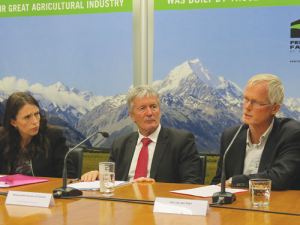DairyNZ and Beef + Lamb NZ wrap up M. bovis compensation support after $161M in claims
Compensation assistance for farmers impacted by Mycoplama bovis is being wound up.
 Prime Minister Jacinda Ardern, Agriculture Minister Damien O’Connor and DairyNZ chair Jim van der Poel addressing the media conference at Federated Farmers headquarters in Wellington last week that outlined the joint industry-government decision to go for a phased eradication of the cattle disease Mycoplasma bovis.
Prime Minister Jacinda Ardern, Agriculture Minister Damien O’Connor and DairyNZ chair Jim van der Poel addressing the media conference at Federated Farmers headquarters in Wellington last week that outlined the joint industry-government decision to go for a phased eradication of the cattle disease Mycoplasma bovis.
One person describes eradicating Mycoplasma bovis as like “trying to build an aeroplane while it is still flying” and there is some truth in that.
Government, industry to eradicate M. bovis at a cost of $886m.
The tracing procedures are difficult, the tests complex and prevention at this stage is not easy.
Neither the Prime Minister, the Minister of Agriculture, nor any MPI official or industry representative, at last week’s announcement of the eradication campaign, would put their hand on their heart and say the plan will succeed.
Their line was, “we think we have discovered it early in the piece so we need to have a shot at eradication” – rather than effectively doing nothing and just managing it as most countries do.
Eradication will see at least 150,000 animals slaughtered – possibly more – over two years and at least 192 properties will have their animals slaughtered with still no guarantee of success.
The $886 million cost will be shared between the Government and the industry, namely DairyNZ and Beef + Lamb NZ who support the plan.
The Government will meet 68 % of the cost, and DNZ and BLNZ 32%. Money from these two industry organisations will come from a special biosecurity levy linked to their Government Industry Arrangement (GIA) on biosecurity.
Money from standard commodity levies that are used to fund DairyNZ and BLNZ cannot be used to fund biosecurity, so a special levy will be made, as approved by farmers in the GIA consultation process.
Rural News understands that the details of how this special levy will be collected and which organisation will pay what amount is still being worked out. However, it’s believed that in general the dairy industry will pay more by virtue of the fact that it has more cows than the beef sector.
It’s also believed that, in the first instance, the Government will pay the up-front cost of eradication. DairyNZ and B+LNZ will repay this over time on the basis that the levy collected from farmers will not be too big in the first two years of the eradication.
Waikato dairy farmer Neil Bateup, made a companion of the New Zealand Order of Merit (CNZM) in the New Year 2026 Honours list, says he’s grateful for the award.
Another Australian state has given the green light to virtual fencing, opening another market for Kiwi company Halter.
Farmer interest continues to grow as a Massey University research project to determine the benefits or otherwise of the self-shedding Wiltshire sheep is underway. The project is five years in and has two more years to go. It was done mainly in the light of low wool prices and the cost of shearing. Peter Burke recently went along to the annual field day held Massey's Riverside farm in the Wairarapa.
Applications are now open for the 2026 NZI Rural Women Business Awards, set to be held at Parliament on 23 July.
Ravensdown has announced a collaboration with Kiwi icon, Footrot Flats in an effort to bring humour, heart, and connection to the forefront of the farming sector.
Forest & Bird's Kiwi Conservation Club is inviting New Zealanders of all ages to embrace the outdoors with its Summer Adventure Challenges.